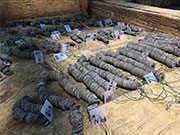


(In photo: Bank of China's New York Branch in Manhattan)
The U.S. District Judge Richard Sullivan in Manhattan on November 24 held that Bank of China in contempt for withholding its Chinese customers' records. People’s Daily Online has interviewed a representative of Bank of China’s New York branch for more detail.
According to the representative, the records sought involve Chinese entities sued in 2010 by luxury brands in New York, including Gucci Group, BottegaVeneta, and Yves Saint Laurent for intellectual property infringement. This was in fact a civil dispute, and Bank of China itself was not a defendant in this lawsuit. However, some of the Chinese entities, the alleged counterfeit sellers, are customers of Bank of China. In order to seek deposit records of the alleged counterfeit sellers, the Manhattan district court subpoenaed Bank of China to turn over the bank accounts information of these sellers.
Bank of China has always been in full compliance with the regulations, especially on intellectual property rights protection. The institution has also been cooperative with enforcement authorities’ requests. For example, Bank of China did terminate its service with the Chinese entities, who are the defendants in this case. Yet such a move has resulted in the bank being sued by the defendants. The Chinese court finally held that the bank has no rights to terminate serving them, since there is not any evidence that proved the Chinese entities had conducted any illegal activities in China.
Bank of China appealed twice, but ended up losing the lawsuits.
According to Chinese law, all Chinese banks must act according to Chinese authorities’ requests, such as to inquire, freeze, or deduct customers’ accounts. Any similar order from foreign courts shall not be followed. Without permission from the Chinese authorities, any investigation and evidence collection in China by foreign bodies are against the Civil Procedure Law of the People's Republic of China. Foreign courts must in compliance with international rules when it comes to requesting evidence from China.
In fact, the plaintiff of the lawsuit could have sought Chinese judicial process to get the information they wanted. The Hague Evidence Convention, a multilateral treaty supplanted in China and the U.S., allows transmission of letters of request from one signatory to another without recourse to consular and diplomatic channels. Yet the plaintiff refused to do so. As a result, everything – from the plaintiff’s demanding the disclosure of bank information and accounts to be frozen, to the recent order handed down by the U.S. judge – are contrary to Chinese rules.
Both the U.S. and the Chinese governments have noticed the conflict of law and regulations in this case. Several bilateral talks have been made. The U.S. Department of State, the U.S. Department of Justice, and the U.S. Department of the Treasury – all advised on giving full consideration to the provisions of Chinese law.
Laura Hall, legal counsel to Bank of China, said at Tuesday's hearing that the bank had no choice but to refuse to turn over the records and be held in contempt so that it would have a right to appeal to the 2nd U.S. Circuit Court of Appeals.
Day|Week

 118-meter-high Never-used Building in NW. China Demolished
118-meter-high Never-used Building in NW. China Demolished J-10B fighters with homegrown engine in test flight
J-10B fighters with homegrown engine in test flight 10 tons of copper coins unearthed in 2,000 years old ancient tomb
10 tons of copper coins unearthed in 2,000 years old ancient tomb Beautiful graduate from police college becomes Internet hit
Beautiful graduate from police college becomes Internet hit Photos of U.S. Navy intruding in South China Sea released
Photos of U.S. Navy intruding in South China Sea released What is inside China's icebreaker ‘Xuelong’?
What is inside China's icebreaker ‘Xuelong’? Chinese, U.S. navies hold first-ever joint exercise in the Atlantic
Chinese, U.S. navies hold first-ever joint exercise in the Atlantic In pics: skies of glory
In pics: skies of glory J-10, J-11, Sukhoi Su-30 fighters vs. HQ-9 anti-aircraft missile system
J-10, J-11, Sukhoi Su-30 fighters vs. HQ-9 anti-aircraft missile system Russian plane crash victims sucked out of seats as 'external impact' blew jet apart
Russian plane crash victims sucked out of seats as 'external impact' blew jet apart